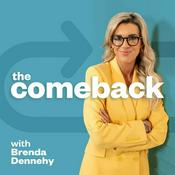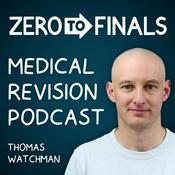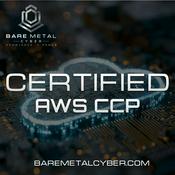The Faster Than Normal Podcast: ADD | ADHD | Health
Peter Shankman

Latest episode
341 episodes
- Today we welcome Matt Canning! A Philadelphia-based technologist, entrepreneur, ex-Fortune 50 executive, and author who founded NoPlex, which empowers individuals struggling with ADHD and anxiety to thrive in a neurotypical world. Matt has a 12-year-old daughter who struggles with ADHD, and her challenges (and the clear gaps in everyday tools for people with ADHD) are what drove him to develop NoPlex. NoPlex turned out to be huge for individuals who struggle with anxiety as well as neurotypical folks, leading to the conclusion that the pace and complexity of life in general have made it such that ADHD-focused tools are applicable for people of all walks of life. This has been atop his pursuits since he was unexpectedly diagnosed in his late 30s. Today we're talking about his journey, chaos and breaking the stigma- Enjoy!
01:45 - Intro and welcome Matt Canning!!
02:31 - First of all, tell us your story and when you got diagnosed?
03:02 - Matt Canning's Journey with ADHD
05:55 - The Development of NoPlex
09:04 - Navigating Neurodiversity and Stigma
12:02 - Tools and Strategies for Managing ADHD
14:53 - Parenting and ADHD: Lessons Learned
15:12 - Why other than NoPlex, obviously, what do you have any secrets that you use or things that you do on a regular basis?"
17:54 - How's your daughter?
17:56 - The Impact of Technology on ADHD
20:52 - Conclusion and Resources for ADHD Support
21:34 - How can people find you?
• Website: https://www.noplex.ai/
Socials: @ noplex.ai on INSTA TikTok Spotify LinkedIN
Thank you for being here- give us a shout anytime!
https://linktr.ee/petershankman
Email: [email protected]
Podcast: Faster Than Normal
Do you know anyone who is doing wonderful things with #ADHD or their neurodivergent brain?
We would love to have them on to learn how they are using their #neurodiversity to their advantage. Shoot me an email and we will get them booked! My link tree is here if you're looking for something specific. https://linktr.ee/petershankman Running Through Ultra-Endurance Challenges: CEO | Entrepreneur | ADHD Advocate Simon Blair of 'Beyond Limits'
15/10/2025 | 25 mins.Our guest today, Simon Blair, is an ultra-endurance athlete and entrepreneur; who is also the founder of the successful London-based property company SHB He is a husband, and father of three. Diagnosed with ADHD later in life, Simon has turned his diagnosis into a source of strength, using ultra-endurance sport as a tool for personal growth and mental maintenance.
Today we discuss the intersection of ADHD, mental health, and extreme sports. Simon shares his journey from being diagnosed with ADHD later in life to using ultra-endurance sports as a tool for personal growth, brain management and mental clarity. The conversation delves into the challenges and triumphs of living with ADHD, the importance of diagnosis, and how Simon's documentary, "Beyond Limits," explores these themes. We're talking resilience, neurodiversity, and the power of pushing beyond perceived limits- enjoy!
01:27 - Introducing and welcome Simon Blair!!
01:55 - ADHD and Ultra-Endurance Sports Dive into his inspiring journey and documentary 'Beyond Limits.' Watch now on Amazon Prime! #ADHD #Endurance #Inspiration
02:43 - Personally speaking..
05:50 - When were you diagnosed?
06:00 - Influences of ADHD on daily life
09:08 - Finding balance through exercise, aka self-medication
11:51 - Connections between nature and mental health
14:51 - Documentary/learned insights and personal growth
17:41 - The many roles of neurodiversity in society
20:44 - What's next for you Simon?
22:20 - How can we find you?
Website: https://shbre.co.uk/about
Socials: @ LinkedIN: linkedin.com/in/simon-blair-a4000510
Thank you for being here- give us a shout anytime!
https://linktr.ee/petershankman
Email: [email protected]
Podcast: Faster Than Normal
Do you know anyone who is doing wonderful things with #ADHD or their neurodivergent brain?
We would love to have them on to learn how they are using their #neurodiversity to their advantage. Shoot me an email and we will get them booked! My link tree is here if you're looking for something specific. https://linktr.ee/petershankmanUnlocking Cosmic Confidence: Divergent By Design's Praxie Osong on ADHD and Astrology
08/10/2025 | 17 mins.Our guest today, Praxie Osong is the founder of Divergent by Design Co, where she offers neurodivergent-affirming natal chart readings for late-diagnosed ADHD and autistic adults. With astrology as her lifelong passion and a lived experience of neurodivergence, Praxie's approach centers on self-acceptance, strengths, and "cosmic confidence," helping clients reframe their stories and embrace their authentic selves. Her sessions are collaborative, empowering, and rooted in the belief that being "Divergent by Design" is something to celebrate, not fix. Praxie's mission: to create an affirming space where neurodivergent folks feel seen, validated, and inspired to trust their own path. Enjoy!
01:27 - Introducing and welcome Praxie Osong!
02:00 - You can't pick your neighbors in this solar system
03:05 - So were you diagnosed ADHD early, or a little later in life?
03:53 - When/how did you begin to utilize your ADHD toolkit?
05:12 - What's your take on connecting Astrology and ADHD?
06:00 - A little about nature-versus-nurture, masking, hyper focus
07:13 - Can you walk us through how you'd help someone struggling with ADHD—like trouble focusing, job loss, feeling overwhelmed? Ref: What is a "house" in astrology?
09:55 - How do you begin a conversation with someone who's skeptical?
11:14 - We only know about six percent of what is on this planet.
12:30 - Have you noticed any patterns or trends in your experience that might stand out to you—even patterns that people unfamiliar with astrology and sign charting might overlook?
15:10 - How can we find you?
Website: divergentbydesign.co
Socials: @divergentbydesign on INSTA and TikTok
15:48 - Thank you Praxie, and thank you for being here- give us a shout anytime!
https://linktr.ee/petershankman
Email: [email protected]
Podcast: Faster Than Normal
Do you know anyone who is doing wonderful things with #ADHD or their neurodivergent brain?
We would love to have them on to learn how they are using their #neurodiversity to their advantage. Shoot me an email and we will get them booked! My link tree is here if you're looking for something specific. https://linktr.ee/petershankman- Having ADD or ADHD is a gift, not a curse. Hear from people all around the globe, from every walk of life, in every profession, from Rock Stars to CEOs, from Teachers to Politicians, who have learned how to unlock the gifts of their ADD and ADHD diagnosis, and use it to their personal and professional advantage, to build businesses, become millionaires, or simply better their lives.
Our guest today, Nicole Groman is a registered dietitian who helps people heal their relationship with food and their bodies. She empowers her clients to let go of dieting and find peace enjoying all foods without guilt. Nicole shares her non-diet approach and practical tips on Instagram @thehungryclementine and has created an apparel line celebrating freedom from dieting. Special thanks to friend of the show Jenn for the introduction- Enjoy!
01:45 - Introducing and welcome Nicole Gorman!
02:39 - What's your story?
04:42 - What's the connection between food and ADHD?
05:50 - If we didn't need food then…
07:00 - On moderation and food and control
07:58 - What is the middle ground or the compromise as you think about & consider which foods you use
09:45 - No restriction Pizza?
11:30 - About the connection between emotions and choices of comfort and simplicity
15:18 - On comparing tool boxes and rituals
15:55 - Food versus other addictions
17:25 - Could you share with us a few tips that you would recommend for our listeners?
21:00 - On why and how make room for the middle ground in your cravings and needs
23:00 - Intuitive eating versus scanning the numbers
23:20 - How can we find you?
Website: https://www.nicolegroman.com/
Socials: @thehungryclementine on INSTA and TikTok
Thank you Nicole, and thank you for being here!! Give us a shout anytime!
https://linktr.ee/petershankman
Email: [email protected]
Podcast: Faster Than Normal
Do you know anyone who is doing wonderful things with #ADHD or their neurodivergent brain?
We would love to have them on to learn how they are using their #neurodiversity to their advantage. Shoot me an email and we will get them booked! My link tree is here if you're looking for something specific. https://linktr.ee/petershankman - Our guest today, Clifford Myers is a 16-year stand-up comedy veteran, Founder of The Other Comedy Company, and President of The Canadian Association of Stand-up, Sketch and Improv Comedians (CASC).Clifford uses his unique position at the intersection of comedy, education and advocacy to speak on ADHD, humor and creativity as complex human traits, the importance of communal learning, emotional-drivers, adversity, authenticity and self-acceptance. Today we learn about how he harneses his ADHD to propel his comedic career- Enjoy!
Introducing and welcome Clifford Myers
So, were you diagnosed at school or did it happen years later?
Tell me how the comedy started.
I'm assuming it was that rush of you come off the stage, you're like, hs!
When you first started versus now are people more open about their neurodiversity that you seeing
Talk about how you use comedy outside of doing stand-up, outside of comedy, just on a regular basis to improve your life.
How does ADHD or neurodiversity help you on stage?
How can we find your great work!?
17:22 - Thank you for being here!! Give us a shout anytime!
https://linktr.ee/petershankman
Email: [email protected]
Podcast: Faster Than Normal
Do you know anyone who is doing wonderful things with #ADHD or their neurodivergent brain?
We would love to have them on to learn how they are using their #neurodiversity to their advantage. Shoot me an email and we will get them booked! My link tree is here if you're looking for something specific. https://linktr.ee/petershankman
More Education podcasts
Trending Education podcasts
About The Faster Than Normal Podcast: ADD | ADHD | Health
Having ADD or ADHD is a gift, not a curse. Hear from people all around the globe, from every walk of life, in every profession, from Rock Stars to CEOs, from Teachers to Politicians, who have learned how to unlock the gifts of their ADD and ADHD diagnosis, and use it to their personal and professional advantage, to build businesses, become millionaires, or simply better their lives.
Podcast websiteListen to The Faster Than Normal Podcast: ADD | ADHD | Health, The Jefferson Fisher Podcast and many other podcasts from around the world with the radio.net app

Get the free radio.net app
- Stations and podcasts to bookmark
- Stream via Wi-Fi or Bluetooth
- Supports Carplay & Android Auto
- Many other app features
Get the free radio.net app
- Stations and podcasts to bookmark
- Stream via Wi-Fi or Bluetooth
- Supports Carplay & Android Auto
- Many other app features


The Faster Than Normal Podcast: ADD | ADHD | Health
Scan code,
download the app,
start listening.
download the app,
start listening.




































